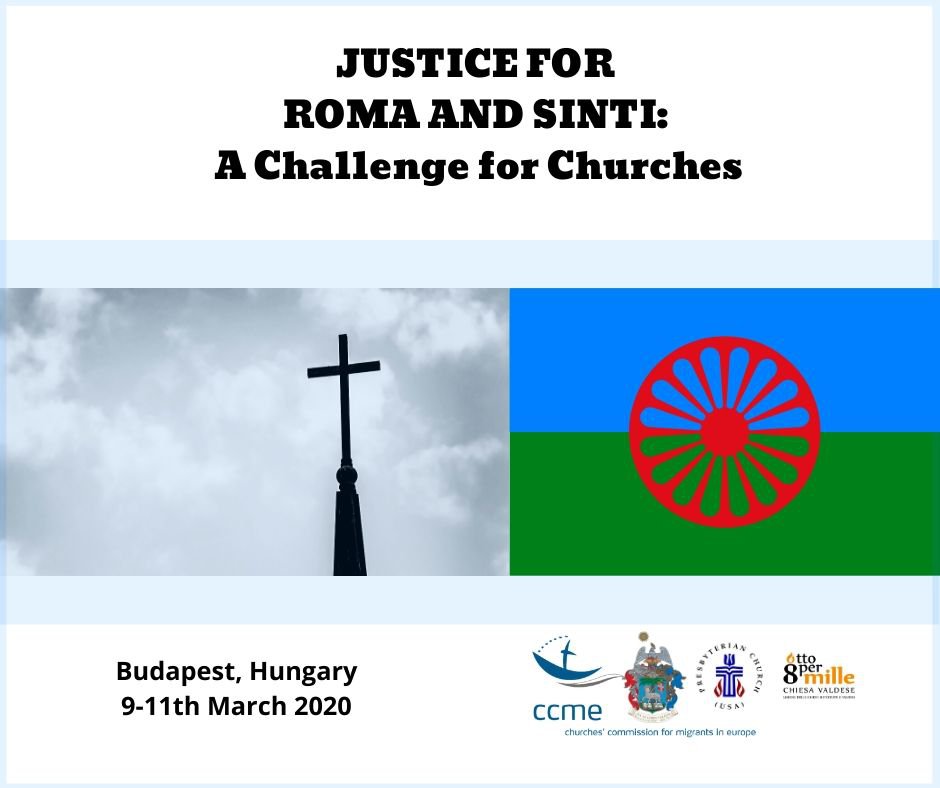Under the title “Justice for Roma and Sinti – a challenge for churches” Churches´ Commission for Migrants in Europe will organize in cooperation with the Reformed Church in Hungary a conference to be held 9 – 11 March 2020 in Budapest.
Context
Roma and Sinti are among those groups most affected by racism, xenophobia, discrimination and all forms of social and cultural exclusion. Roma are a minority in almost every European country, Sinti in several. A number of churches have over the years become aware of widespread discrimination against Roma, Sinti and others and acknowledged their role in the exclusion of Roma. In 2001 CCME hosted an ecumenical conference in Bratislava and drew together recommendations to improve Roma inclusion in church life and wider society. The concluding document detailed a number of areas in which churches should be actively involved in empowering Roma and building more inclusive communities. At the CEC General Assembly in Trondheim in 2003, some of the Nordic churches recognised the ongoing task to work at ‘healing of memories’ and human rights work related to Roma. A positive step in reconciliation was their confession of guilt.
A decade later in 2013 in Frankfurt representatives of European member churches of the Lutheran World Federation and CCME came together to review Roma inclusion. The participants emphasised the need for churches to create space for face-to-face interactions with Roma and sharing of life stories, culture and worship. They also saw the ongoing need to speak out against hostility directed at Roma people.
Churches address socio-diaconal issues of Roma inclusions on different levels. However, visibility and attention for Roma and Sinti as part of the common household of God within the churches remains marginal. It is against this background that the CCME General Assembly in 20017 decided that CCME should address the issue of Roma discrimination with a particular focus on the role of churches. During the planning of this conference, it was decided to address the issue in reference to Roma and Sinti.

Conference aims:
The conference aims at:
1) giving voice to Roma/Sinti expectations of churches to improve Roma/sinti inclusion,
2) stocktaking of churches participation in legitimation and practice of discrimination against Roma/sinti,
3) exchanging of good practice of church evaluation and confession of discriminatory responses and moves towards reconciliation to the Roma/Sinti community in church history,
4) considering of next steps to give more visibility to Roma and promote a positive Roma/Sinti narrative - within the churches and society.
Participants
The conference aims at bringing together some 20-25 international participants along with Hungarian participants. Participants should preferably be working on the issues of the conference or intend to work on them in a church context. We would very much like to request that you nominate persons who themselves are of Roma or Sinti background.
Deadline for registration is 10th February. CCME will make a selection aiming at assuring a mix of different gender, regions of origin, ages, denominations as well as a good representation of Roma and Sinti. Relevance of the conference for the nominee will obviously also be very important so please find some time to fill in the respective part of the form which is attached.
Methods
The methodology is very much built around the learning from good practice – of churches in Europe. The experiences of the Reformed church in Hungary will be of particular importance. We will hear from churches already active and will witness work in and around Budapest as well as giving space for exchange on future work.
Practicalities
There is a participation fee of 150,- EUR per participant covering full board, lodging and conference events. In cases, where paying this fee would constitute an unsurmountable challenge for the participation, a reduction can be agreed upon.
The language of the conference is English (with some parts being translate to/from Hungarian) and participants are expected to be able to follow and contribute in English. In specific cases however, we can agree on informal arrangements e.g. one participant helping another participant with the same linguistic background.